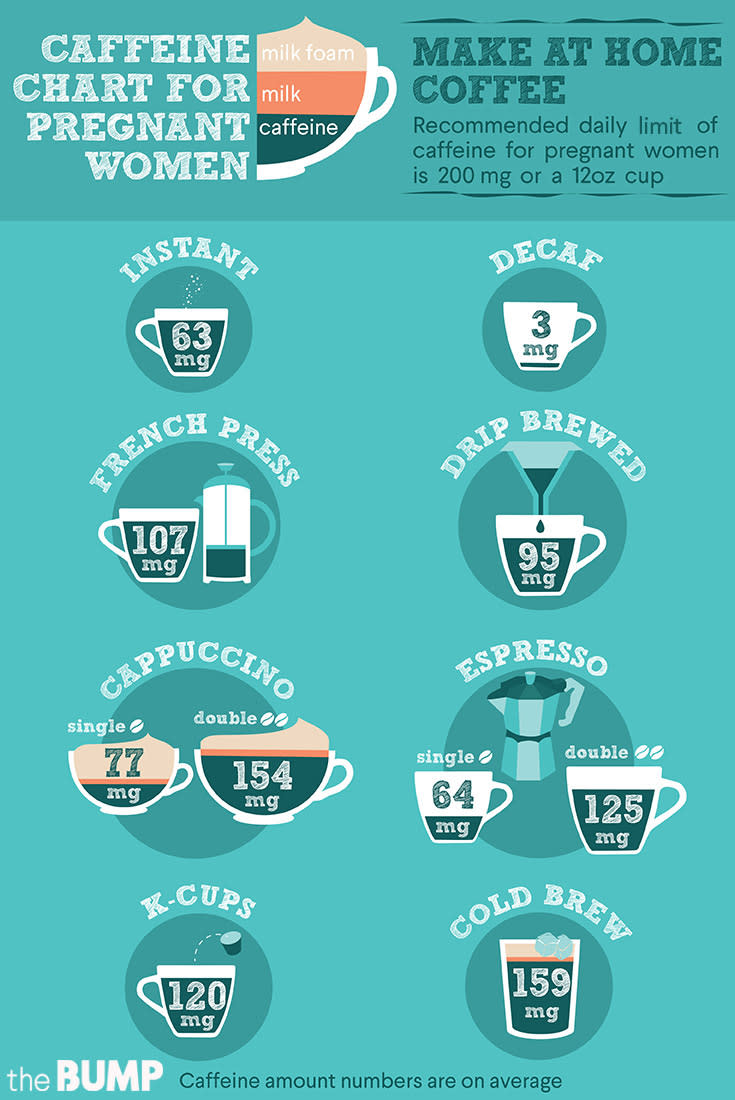
The major factors observed by OB-GYNs are Reduces muscle activity in the fallopian tubes. Although researchers havent been able to find a clear connection between moderate caffeine intake and fertility.
Caffeine also tends to increase the frequency of urination thus causing a decrease in body fluid levels and resulting in possible dehydration.
How does caffeine affect pregnancy. Because caffeine is a stimulant it increases your blood pressure and heart rate both of which are not recommended during pregnancy. Caffeine also increases the frequency of urination. This causes a reduction in your body fluid levels and can lead to dehydration.
Caffeine crosses the placenta to your baby. As a stimulant caffeine tends to increases a persons blood pressure and heart rate. Both of these effects should generally be avoided during pregnancy.
Caffeine also tends to increase the frequency of urination thus causing a decrease in body fluid levels and resulting in possible dehydration. Caffeine Crosses the Placenta to the Baby. Caffeine can also lead to heartburn by causing the production of stomach acid.
These effects may be more noticeable as your pregnancy progresses. Thats because your bodys ability to break down caffeine slows so you end up with a higher level of it in your bloodstream. Caffeine intake may cause you to absorb less iron and calcium from foods a possible detriment to your babys overall fetal development.
Recent studies have focused on the effects of coffee intake during pregnancy. Thus the greatly increased half-life of caffeine during pregnancy could produce adverse effects at a consumption which although considered as high is not excessive under normal conditions. This possibly explains the observation that heavy coffee drinking during pregnancy is linked to a.
Some studies have found a link between caffeine consumption and a womans ability to conceive while others have not. Most experts say there just isnt enough evidence to make a definite conclusion about caffeine and fertility. Although researchers havent been able to find a clear connection between moderate caffeine intake and fertility.
The studys results showed that. Drinking 300 mg of caffeine increased the risk of early pregnancy loss or spontaneous abortion SAB. Drinking 600 mg of caffeine more than doubled the risk of miscarriage.
Caffeine did not however impact the time it took. As mentioned in the articles published in 2008 consuming too much caffeine may bring a vaso-constrictive effect on the pregnant women. It means the caffeine can reduce the blood flow to the fetus and the placenta.
Caffeine takes longer to be broken down in the body during pregnancy and it reaches the baby through the placenta. The developing baby is not great at processing caffeine and it. For many people caffeine has favorable effects on energy levels focus and even migraines.
Additionally some caffeinated beverages offer health benefits. One study found that the amount of caffeine ingested while pregnant wouldnt have an effect on the babys sleep during the first three months of their life. Researchers at the University of.
KEY POINTS We dont know a lot about the effects of caffeine during pregnancy on you and your baby. So its best to limit the. If youre pregnant limit caffeine to 200 milligrams each day.
This is about the amount in 1½ 8-ounce cups of coffee or. If youre breastfeeding limit caffeine to no. There is no clear proof of the direct effect of caffeine on pregnant women but observations and examinations have given a slight hint on the adverse impact of caffeine intake.
The major factors observed by OB-GYNs are Reduces muscle activity in the fallopian tubes. Ceases specialized pacemaker cells in the wall of the tubes. Caffeine can affect your body during pregnancy.
Excessive amounts of caffeine can lead to lower birth weight and reduced blood flow through the placenta during pregnancy. Although when it comes to effects on female fertility specifically the connection isnt as straightforward. How does caffeine affect my baby.
Caffeine crosses the placenta to reach your baby. Regularly having more than the recommended amount of caffeine during pregnancy may increase the risk of or of your baby being born premature or with a low birth weight. It can even increase the chance of a miscarriage although the risk is still small.
Consuming large amounts of caffeine during pregnancy may increase the risk of miscarriage or low birthweight so its best to limit your intake of caffeine. Caffeine is a chemical found in many foods and drinks including coffee tea and cola. It affects the nervous system and can cause irritability nervousness and sleeplessness.
Caffeine can decrease fertility because the caffeine causes blood vessels to tighten slowing the blood flow to the uterus which may aggravate the process of implanting the egg. Consequently coffee consumption has an effect over a womans fertility or rather a womans infertility in this case.
